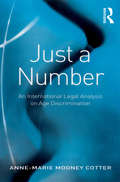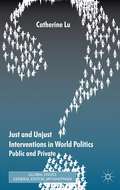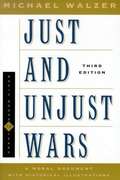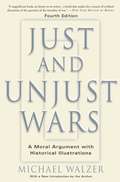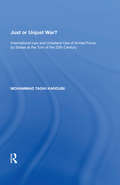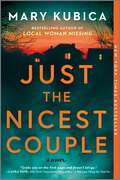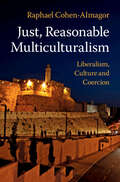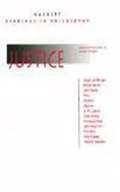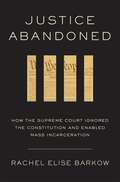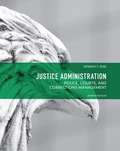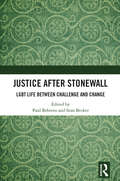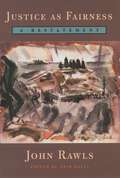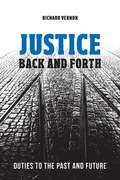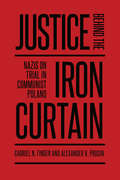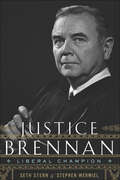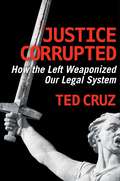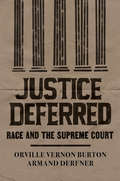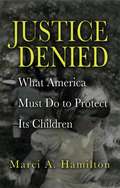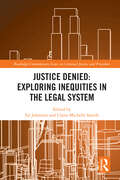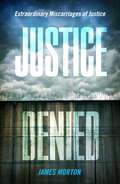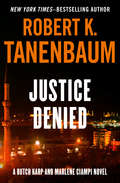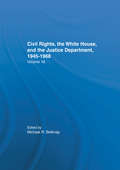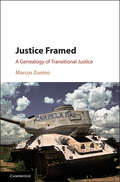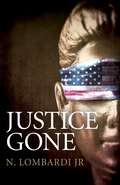- Table View
- List View
Just a Number: An International Legal Analysis on Age Discrimination
by Anne-Marie Mooney CotterWhilst workers' organizations and third-party analysts around the world commonly cite age as the most prevalent form of discrimination in the workplace, age discrimination has not had the same high profile as discrimination on grounds of sex or race. This book allows readers to better understand the issue of ageism and inequality. It examines the primary role of legislation and court process in combating age discrimination at both national and international levels. Including the role of NAFTA and the EU in this respect, it also provides a detailed examination of the relationship between age issues and the law, and will be an important resource for those involved in age discrimination and elder rights.
Just and Unjust Interventions in World Politics: Public And Private (Global Issues)
by Catherine LuTaking insights and controversies from feminist political theory, Lu looks to illuminate alternative images of 'sovereignty as privacy' and 'sovereignty as responsibility', and to identify new challenges arising from the increased agency of private global civil society, and their relationship with the world of states.
Just and Unjust Military Intervention
by Stefano Recchia Jennifer M. WelshClassical arguments about the legitimate use of force have profoundly shaped the norms and institutions of contemporary international society. But what specific lessons can we learn from the classical European philosophers and jurists when thinking about humanitarian intervention, preventive self-defense or international trusteeship today? The contributors to this volume take seriously the admonition of contextualist scholars not to uproot classical thinkers' arguments from their social, political and intellectual environment. Nevertheless, this collection demonstrates that contemporary students, scholars and policymakers can still learn a great deal from the questions raised by classical European thinkers, the problems they highlighted, and even the problematic character of some of the solutions they offered. The aim of this volume is to open up current assumptions about military intervention, and to explore the possibility of reconceptualizing and reappraising contemporary approaches.
Just and Unjust Wars: A Moral Argument With Historical Illustrations, 3rd Ed.
by Michael WalzerThis classic work examines the issues surrounding military theory, war crimes, and the spoils of war from the Athenian attack on Melos to the My Lai massacre. A revised and updated classic treatment of the morality of war written by one of our country's leading philosophers. Just and Unjust Wars examines a variety of conflicts in order to understand exactly why, according to Walzer, "the argument about war and justice is still a political and moral necessity." Walzer's classic work draws on historical illustrations that range all the way from the Athenian attack on Melos to this morning's headlines, and uses the testimony of participants-decision makers and victims alike-to examine the moral issues of warfare.
Just and Unjust Wars: A Moral Argument with Historical Illustrations, 4th Ed.
by Michael WalzerFrom the Athenian attack on Melos to the My Lai Massacre, from the wars in the Balkans through the first war in Iraq, Michael Walzer examines the moral issues surrounding military theory, war crimes, and the spoils of war. He studies a variety of conflicts over the course of history, as well as the testimony of those who have been most directly involved--participants, decision makers, and victims. In his introduction to this new edition, Walzer specifically addresses the moral issues surrounding the war in and occupation of Iraq, reminding us once again that "the argument about war and justice is still a political and moral necessity. "
Just or Unjust War?: International Law and Unilateral Use of Armed Force by States at the Turn of the 20th Century
by Mohammad Taghi KaroubiThis study examines the traditional theory of just war in the light of modern principles of international law relating to the prohibition on the use of force repeatedly stressed by UNGA (United Nations General Assembly) resolutions and accepted by the ICJ (International Court of Justice). The author expresses doubts as to whether actions by some permanent members of the Security Council starting from September 1996 until April 2003, in the Balkans and the Persian Gulf, are legitimate under the just war theory, or any other rules of international law, and analyses in detail the claims made by the allied powers to justify their actions. The book also examines the significance of the transformation in the limitation and prohibition of the use of force in the contemporary legal system, by studying the origin of those tenets and their reflection in both the national laws of individual states and the international laws of armed conflict.
Just the Nicest Couple: A Novel
by Mary KubicaA NEW YORK TIMES BESTSELLER&“Grabs you on the first page and doesn&’t let go until you reach the end.&” —Laura Dave, New York Times bestselling author of The Last Thing He Told MeA husband&’s disappearance links two couples in this twisty thriller from the New York Times bestselling author of Local Woman Missing, Mary Kubica Jake Hayes is missing. This much is certain. At first, his wife, Nina, thinks he is blowing off steam at a friend&’s house after their heated fight the night before. But then a day goes by. Two days. Five. And Jake is still nowhere to be found.Lily Scott, Nina&’s friend and coworker, thinks she may have been the last to see Jake before he went missing. After Lily confesses everything to her husband, Christian, the two decide that nobody can find out what happened leading up to Jake&’s disappearance, especially not Nina. But Nina is out there looking for her husband, and she won&’t stop until the truth is discovered."Rich with detail and a mounting, almost suffocating sense of dread, Just the Nicest Couple is a dark and twisted exploration of loyalty, family, and how far we&’ll go to protect the ones we love." —Andrea Bartz, New York Times bestselling author of We Were Never HereDon't miss Mary Kubica's newest novel, She's Not Sorry, where an ICU nurse accidentally uncovers a patient's frightening past...Look for these other edge-of-your-seat thrillers by New York Times bestselling author Mary Kubica: The Good Girl The Other Mrs. Local Woman Missing She's Not Sorry It's Not Her
Just, Reasonable Multiculturalism: Liberalism, Culture and Coercion
by Raphael Cohen-AlmagorThis book explores the main challenges against multiculturalism. It aims to examine whether liberalism and multiculturalism are reconcilable, and what are the limits of liberal democratic interventions in illiberal affairs of minority cultures within democracy. In the process, this book addresses three questions: whether multiculturalism is bad for democracy, whether multiculturalism is bad for women, and whether multiculturalism contributes to terrorism. Just, Reasonable Multiculturalism argues that liberalism and multiculturalism are reconcilable if a fair balance is struck between individual rights and group rights. Raphael Cohen-Almagor contends that reasonable multiculturalism can be achieved via mechanisms of deliberate democracy, compromise and, when necessary, coercion. Placing necessary checks on groups that discriminate against vulnerable third parties, the approach insists on the protection of basic human rights as well as on exit rights for individuals if and when they wish to leave their cultural groups.
Justice (Hackett Readings in Philosophy)
by Jonathan WestphalThe readings in Justice include the central philosophical statements about justice in society organized to illustrate both the political vision of a good society and different attempts at an analysis of the concept of justice.
Justice Abandoned: How the Supreme Court Ignored the Constitution and Enabled Mass Incarceration
by Rachel Elise BarkowAn influential legal scholar argues that the Supreme Court played a pivotal role in the rise of mass incarceration in America.With less than 5 percent of the world’s population and almost a quarter of its prisoners, America indisputably has a mass incarceration problem. How did it happen? Tough-on-crime politics and a racially loaded drug war are obvious and important culprits, but another factor has received remarkably little attention: the Supreme Court. The Constitution contains numerous safeguards that check the state’s power to lock people away. Yet since the 1960s the Supreme Court has repeatedly disregarded these limits, bowing instead to unfounded claims that adherence to the Constitution is incompatible with public safety.In Justice Abandoned, Rachel Barkow highlights six Supreme Court decisions that paved the way for mass incarceration. These rulings have been crucial to the meteoric rise in pretrial detention and coercive plea bargaining. They have enabled disproportionate sentencing and overcrowded prison conditions. And they have sanctioned innumerable police stops and widespread racial discrimination. If the Court were committed to protecting constitutional rights and followed its standard methods of interpretation, none of these cases would have been decided as they were, and punishment in America would look very different than it does today.More than just an autopsy of the Supreme Court’s errors, Justice Abandoned offers a roadmap for change. Barkow shows that the originalist methodology adopted by the majority of the current Court demands overturning the unconstitutional policies underlying mass incarceration. If the justices genuinely believe in upholding the Constitution in all cases, then they have little choice but to reverse the wrongly decided precedents that have failed so many Americans.
Justice Administration: Police Courts and Corrections Management (Seventh Edition)
by Kenneth J. PeakThis seventh edition of Justice Administration: Police, Courts, and Corrections Management continues its examination of all facets of the criminal justice system as well as several related matters of interest to prospective and current administrators. The general goal of the book is to inform the reader of the primary people, practices, and terms that are utilized in justice administration. The author has held several administrative and academic positions in a criminal justice career spanning more than 35 years; thus, this book’s 16 chapters contain a palpable real-world flavor not found in most textbooks.
Justice After Stonewall: LGBT Life Between Challenge and Change
by Paul Behrens Sean BeckerJustice After Stonewall is an interdisciplinary analysis of challenges and progress experienced by the LGBT community since the Stonewall riots in 1969. The riots (sparked by a police raid in New York City) are a milestone in LGBT history. Within a short time, a new feeling of confidence emerged, manifested in new LGBT organisations and the first Pride marches. Legal and social change followed: from the decriminalisation of homosexual activities to anti-discrimination laws and the legalisation of same-sex marriage. This makes it tempting to think of modern LGBT history as an unequivocal success story. But progress was not achieved everywhere: in 70 States, same-sex relations are still criminalised; violence against LGBT persons still occurs, and transgender people still struggle to have their rights recognised. The question whether the path since Stonewall represents success or failure cannot be answered by one discipline alone. This book breaks new ground by bringing together experts from politics, sociology, law, education, language, medicine and religion to discuss fields as diverse as same-sex marriage, transgender students, the LGBT movement in Uganda and LGBT migrants in the Arabian Peninsula, conversion 'therapy', and approaches to LGBT matters in Judaism, Christianity and Islam. What emerges is a rich tapestry of LGBT life today and its consideration from numerous perspectives. Based on thorough research, this book is an ideal text for students and scholars exploring LGBT matters. At the same time, its engaging style makes it a particularly valuable resource for anyone with an interest in LGBT matters and their reception in today's world.
Justice As Fairness: A Restatement
by John Rawls Erin KellyThis book originated as lectures for a course on political philosophy that Rawls taught regularly at Harvard in the 1980s. In time the lectures became a restatement of his theory of justice as fairness, revised in light of his more recent papers and his treatise Political Liberalism (1993). As Rawls writes in the preface, the restatement presents "in one place an account of justice as fairness as I now see it, drawing on all [my previous] works. " He offers a broad overview of his main lines of thought and also explores specific issues never before addressed in any of his writings. Rawls is well aware that since the publication of A Theory of Justice in 1971, American society has moved farther away from the idea of justice as fairness. Yet his ideas retain their power and relevance to debates in a pluralistic society about the meaning and theoretical viability of liberalism. This book demonstrates that moral clarity can be achieved even when a collective commitment to justice is uncertain.
Justice Back and Forth: Duties to the Past and Future
by Richard VernonIdeas of justice have traditionally focused on what individuals owe to one another and have drawn our attention to what is considered fair - what one of us owes to another is justly matched by what the other owes to them. However, what does justice require us to do for past and future generations?In Justice Back and Forth, award-winning author Richard Vernon explores the possibility of justice in cases where time makes reciprocity impossible. This "temporal justice" is examined in ten controversial cases including the duty to return historical artifacts, the ethics and politics of parenting, the punishment of historical offences, the right to procreate, and the imposition of constitutions on future citizens. By deftly weaving together discussions on historical redress and justice for future generations, Vernon reveals that these two opposing topics can in fact be used to illuminate each other. In doing so, he concludes that reciprocity can be adapted to serve intergenerational cases.
Justice Behind the Iron Curtain: Nazis on Trial in Communist Poland (German and European Studies)
by Alexander Prusin Gabriel FinderIn Justice Behind the Iron Curtain, Gabriel N. Finder and Alexander V. Prusin examine Poland’s role in prosecuting Nazi German criminals during the first decade and a half of the postwar era. Finder and Prusin contend that the Polish trials of Nazi war criminals were a pragmatic political response to postwar Polish society and Poles’ cravings for vengeance against German Nazis. Although characterized by numerous inconsistencies, Poland’s prosecutions of Nazis exhibited a fair degree of due process and resembled similar proceedings in Western democratic counties. The authors examine reactions to the trials among Poles and Jews. Although Polish-Jewish relations were uneasy in the wake of the extremely brutal German wartime occupation of Poland, postwar Polish prosecutions of German Nazis placed emphasis on the fate of Jews during the Holocaust. Justice Behind the Iron Curtain is the first work to approach communist Poland’s judicial postwar confrontation with the legacy of the Nazi occupation.
Justice Brennan: Liberal Champion
by Seth Stern Stephen WermielA sweeping insider look at the life of William Brennan, champion of free speech and widely considered the most influential Supreme Court justice of the twentieth centuryBefore his death, William Brennan granted Stephen Wermiel access to volumes of personal and court materials that are sealed to the public until 2017. These are what Jeffrey Toobin has called “a coveted set of documents” that includes Brennan’s case histories—in which he recorded strategies behind all the major battles of the past half century, including Roe v. Wade, affirmative action, the death penalty, obscenity law, and the constitutional right to privacy—as well as more personal documents that reveal some of Brennan's curious contradictions, like his refusal to hire female clerks even as he wrote groundbreaking women’s rights decisions; his complex stance as a justice and a Catholic; and details on Brennan’s unprecedented working relationship with Chief Justice Earl Warren. Wermiel distills decades of valuable information into a seamless, riveting portrait of the man behind the Court's most liberal era.
Justice Corrupted: How the Left Weaponized Our Legal System
by Ted Cruz. . . with liberty and justice for some. The left has corrupted the U.S. legal system. Wielding the law as a weapon, arrogant judges and lawless prosecutors are intimidating, silencing, and even imprisoning Americans who stand in the way of their radical agenda. Their "enemies list" even includes parents who dare to speak up for their children at school board meetings. <p><p>In this shocking new book, Senator Ted Cruz takes readers inside the justice system, showing how the wrong hands on the levers of power can strangle liberty, crush opposition, and wreck lives. The notion of a "Democratic" or "Republican" Department of Justice is outrageous. That institution should safeguard the Constitutional rights of all Americans. <p><p>Justice Corrupted will equip patriots and lovers of liberty to hold their government accountable. <p> <b>New York Times Bestseller</b>
Justice Deferred: Race and the Supreme Court
by Orville Vernon Burton Armand DerfnerIn the first comprehensive accounting of the U.S. Supreme Court’s race-related jurisprudence, a distinguished historian and renowned civil rights lawyer scrutinize a legacy too often blighted by racial injustice. The Supreme Court is usually seen as protector of our liberties: it ended segregation, was a guarantor of fair trials, and safeguarded free speech and the vote. But this narrative derives mostly from a short period, from the 1930s to the early 1970s. Before then, the Court spent a century largely ignoring or suppressing basic rights, while the fifty years since 1970 have witnessed a mostly accelerating retreat from racial justice. From the Cherokee Trail of Tears to Brown v. Board of Education to the dismantling of the Voting Rights Act, historian Orville Vernon Burton and civil rights lawyer Armand Derfner shine a powerful light on the Court’s race record—a legacy at times uplifting, but more often distressing and sometimes disgraceful. For nearly a century, the Court ensured that the nineteenth-century Reconstruction amendments would not truly free and enfranchise African Americans. And the twenty-first century has seen a steady erosion of commitments to enforcing hard-won rights. Justice Deferred is the first book that comprehensively charts the Court’s race jurisprudence. Addressing nearly two hundred cases involving America’s racial minorities, the authors probe the parties involved, the justices’ reasoning, and the impact of individual rulings. We learn of heroes such as Thurgood Marshall; villains, including Roger Taney; and enigmas like Oliver Wendell Holmes and Hugo Black. Much of the fragility of civil rights in America is due to the Supreme Court, but as this sweeping history also reminds us, the justices still have the power to make good on the country’s promise of equal rights for all.
Justice Denied
by Marci A. HamiltonThere is a silent epidemic of childhood sexual abuse in the United States and a legal system that is not effectively protecting children from predators. Recent coverage of widespread abuse in the public schools and in churches has brought the once-taboo subject of childhood sexual abuse to the forefront. The problem extends well beyond schools and churches, though: the vast majority of survivors are sexually abused by family or family acquaintances with 90 percent of abuse never reported to the authorities. Marci A. Hamilton proposes a comprehensive yet simple solution: eliminate the arbitrary statutes of limitations for childhood sexual abuse so that survivors past and present can get into court. In Justice Denied, Hamilton predicts a coming civil rights movement for children and explains why it is in the interest of all Americans to allow victims of childhood sexual abuse this chance to seek justice when they are ready.al abuse this chance to seek justice when they are ready.
Justice Denied: Exploring Inequities in the Legal System (Routledge Contemporary Issues in Criminal Justice and Procedure)
by Ed Johnston Claire-Michelle SmythThis volume focuses on injustice in the Criminal Justice System in England and Wales and discusses the barriers to achieving justice. The book draws on contributions from established and emerging scholars, as well as insight from professional practice to provide insight into the contemporary challenges in distinct areas of injustice through original analysis and argument. Topics covered include the theory of punishment, criminal justice, access to justice, climate justice, migrant justice and barriers to justice. The volume will be of interest to researchers, academics and policy-makers working in the areas of Criminal Law, Criminology, Sociology of Law and Human Rights Law. Focused on the legal system of England and Wales, the issues raised are relevant for an international readership.
Justice Denied: Extraordinary miscarriages of justice
by James MortonAn incisive examination by the bestselling author of The Mammoth Book of Gangs of some of the many miscarriages of justice of this and the previous century, which have seen innocent men and women found guilty, and sometimes executed. This shocking 'manual of injustice' exposes wrongful convictions and acquittals as a result of the chicanery of some forensic scientists, over-zealous or negligent police officers under pressure to get results, incompetent lawyers, lying witnesses, bribed juries, judicial blunders and feeble politicians. Sometimes, however, it is truculent and uncooperative defendants who prove their own worst enemies. It shows the mistakes that can be made in the face of a baying public and a rabid press, mistakes which have seen innocent men and women found guilty, and sometimes executed, while others have served lengthy sentences. It reveals critical flaws in criminal justice systems throughout the world (it is estimated, for example, that two per cent of felony cases in America result in wrongful convictions). Morton explores folk devils and moral panics, both historical such as the 'witches' of Salem and and much more recent cases like that of the West Memphis Three. It considers cases of race hatred, the impact of DNA, fit-ups, fake 'experts', doubtful science and the long road to the court of appeal. He also looks at what happens to the victims of miscarriages of justice, whether they go on to prosper or, as is sadly so often the case, never really recover. How did the boxer Rubin 'The Hurricane' Carter come to be wrongly convicted of a triple homicide? The alibi of Joe Hill, the Industrial Workers of the World activist wrongly executed for the murder of a Utah grocer and his son, came too late to save him from execution. On the other hand, Lindy Chamberlain (famously portrayed by Meryl Streep in A Cry in the Dark), has finally, over thirty years after the fact, had her claim that her baby Azaria was taken by a dingo at Ayers Rock in the Australian Outback upheld by a coroner. Among many other cases, Morton also considers the 1910 case of two men convicted of the murder of a man still alive in 1926, and case of the West Memphis Three, who were convicted as teenagers in 1994 of the murders of three boys in Arkansas and released in 2011 in a plea bargain after eighteen years, though the prosecution still refuses to accept their innocence.
Justice Denied: Reversible Error, Material Witness, And Justice Denied (Butch Karp and Marlene Ciampi #7)
by Robert K. TanenbaumManhattan&’s homicide bureau chief investigates a murder at the UN in the New York Times–bestselling author&’s &“most powerful thriller yet&” (Vincent Bugliosi). While on his way to the UN, a Turkish diplomat is gunned down in the street. All signs point to an ancient blood feud, and the NYPD quickly tracks down their lead suspect: an Armenian nationalist they believe was out to avenge the Armenian genocide. He fits their suspect profile perfectly—so perfectly, in fact, that Chief Butch Karp is beginning to doubt the story. With the help of his crime-fighting wife Marlene Ciampi, Karp digs into the diplomat&’s death, uncovering a deadly web of corruption far more sinister than even he could have imagined. Written by legendary prosecutor and New York Times–bestselling author Robert K. Tanenbaum, Justice Denied exposes the kind of dirty dealing that goes on in the shadow of the UN. Justice Denied is the 6th book in the Butch Karp and Marlene Ciampi series, but you may enjoy reading the series in any order. &“Tanenbaum&’s experience as a New York City assistant district attorney serves him well in this gritty tale of intrigue.&” —Chicago Tribune &“Scrupulously realistic.&” —Joseph Wambaugh, author of The Onion Field &“A highly satisfying tale.&” —Library Journal
Justice Department Civil Rights Policies Prior to 1960: Crucial Documents from the Files of Arthur Brann Caldwell
by Michal R. BelknapFirst published in 1991. This is Volume 16 of 18 in a series of works on Civil Rights, the White House and the Justice Department from 1945 to 1968. This volume looks at Civil Rights policies prior to 1960 in the Justice Department.
Justice Framed: A Genealogy of Transitional Justice
by Marcos ZuninoWhy are certain responses to past human rights violations considered instances of transitional justice while others are disregarded? This study interrogates the history of the discourse and practice of the field to answer that question. Zunino argues that a number of characteristics inherited as transitional justice emerged as a discourse in the 1980s and 1990s have shaped which practices of the present and the past are now regarded as valid responses to past human rights violations. He traces these influential characteristics from Argentina's transition to democracy in 1983, the end of communism in Eastern Europe, the development of international criminal justice, and the South African truth commission of 1995. Through an analysis of the post-World War II period, the decolonisation process and the Cold War, Zunino identifies a series of episodes and mechanisms omitted from the history of transitional justice because they did not conform to its accepted characteristics.
Justice Gone
by N. Lombardi Jr.WINNER OF FOUR AWARDSNEW YORK CITY BIG BOOK AWARDWINNER 2019 AMERICAN FICTION AWARDWINNER NATIONAL INDIE EXCELLENCE AWARD - Best legal thriller 2019SILVER MEDAL WINNER 2019 READERS' FAVORITES AWARDS - Chosen by Wiki.ezvid.com among their list of 10 Gripping and Intelligent Legal ThrillersWhen a homeless war veteran is beaten to death by the police, stormy protests ensue, engulfing a small New Jersey town. Soon after, three cops are gunned down. A multi-state manhunt is underway for a cop killer on the loose. And Dr. Tessa Thorpe, a veteran's counselor, is caught up in the chase.Donald Darfield, an African-American Iraqi war vet, war-time buddy of the beaten man, and one of Tessa's patients, is holed up in a mountain cabin. Tessa, acting on instinct, sets off to find him, but the swarm of law enforcement officers get there first, leading to Darfield's dramatic capture.Now, the only people separating him from the lethal needle of state justice are Tessa and ageing blind lawyer, Nathaniel Bodine. Can they untangle the web tightening around Darfield in time, when the press and the justice system are baying for revenge?Justice Gone is the first in a series of psychological thrillers involving Dr Tessa Thorpe, wrapped in the divisive issues of modern American society including police brutality and disenfranchised returning war veterans.N Lombardi Jr. is the author of compelling and heartfelt novel The Plain of Jars.
